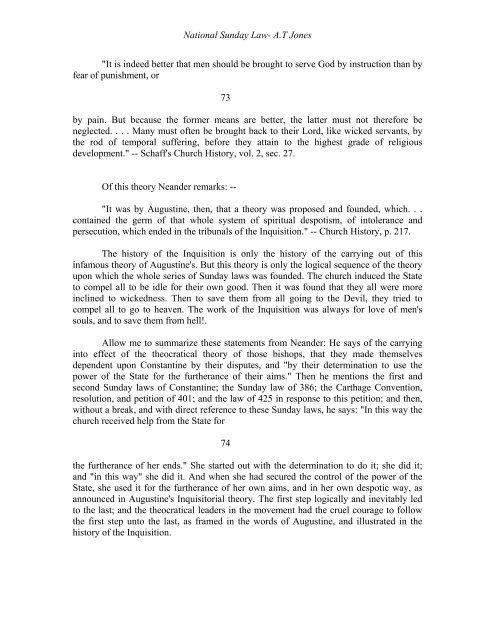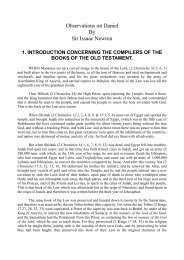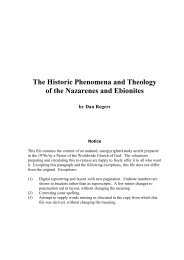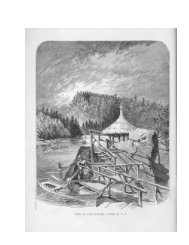THE NATIONAL SUNDAY LAW, ARGUMENT OF ALONZO T ...
THE NATIONAL SUNDAY LAW, ARGUMENT OF ALONZO T ...
THE NATIONAL SUNDAY LAW, ARGUMENT OF ALONZO T ...
Create successful ePaper yourself
Turn your PDF publications into a flip-book with our unique Google optimized e-Paper software.
National Sunday Law- A.T Jones<br />
"It is indeed better that men should be brought to serve God by instruction than by<br />
fear of punishment, or<br />
73<br />
by pain. But because the former means are better, the latter must not therefore be<br />
neglected. . . . Many must often be brought back to their Lord, like wicked servants, by<br />
the rod of temporal suffering, before they attain to the highest grade of religious<br />
development." -- Schaff's Church History, vol. 2, sec. 27.<br />
Of this theory Neander remarks: --<br />
"It was by Augustine, then, that a theory was proposed and founded, which. . .<br />
contained the germ of that whole system of spiritual despotism, of intolerance and<br />
persecution, which ended in the tribunals of the Inquisition." -- Church History, p. 217.<br />
The history of the Inquisition is only the history of the carrying out of this<br />
infamous theory of Augustine's. But this theory is only the logical sequence of the theory<br />
upon which the whole series of Sunday laws was founded. The church induced the State<br />
to compel all to be idle for their own good. Then it was found that they all were more<br />
inclined to wickedness. Then to save them from all going to the Devil, they tried to<br />
compel all to go to heaven. The work of the Inquisition was always for love of men's<br />
souls, and to save them from hell!.<br />
Allow me to summarize these statements from Neander: He says of the carrying<br />
into effect of the theocratical theory of those bishops, that they made themselves<br />
dependent upon Constantine by their disputes, and "by their determination to use the<br />
power of the State for the furtherance of their aims." Then he mentions the first and<br />
second Sunday laws of Constantine; the Sunday law of 386; the Carthage Convention,<br />
resolution, and petition of 401; and the law of 425 in response to this petition; and then,<br />
without a break, and with direct reference to these Sunday laws, he says: "In this way the<br />
church received help from the State for<br />
74<br />
the furtherance of her ends." She started out with the determination to do it; she did it;<br />
and "in this way" she did it. And when she had secured the control of the power of the<br />
State, she used it for the furtherance of her own aims, and in her own despotic way, as<br />
announced in Augustine's Inquisitorial theory. The first step logically and inevitably led<br />
to the last; and the theocratical leaders in the movement had the cruel courage to follow<br />
the first step unto the last, as framed in the words of Augustine, and illustrated in the<br />
history of the Inquisition.
















